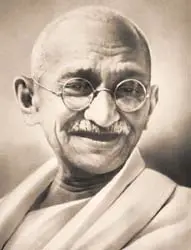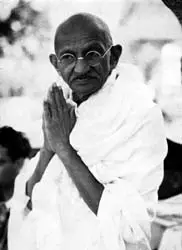Mohandas Gandhi
Mohandas Gandhi is known around the world for his philosophy of passive nonresistance and helping to lead the people of India out of the bonds of being ruled by the British. Referred to as “Mathatma”, which means “Great-souled one”, he changed the history of India for not only its governing but also to allow respect for the oppression of some of the lower classes of citizens. Mahatma Gandhi set the standard for many people that came after him so that they used nonviolence as a way to protest and achieve freedoms.


Gandhi left India at the age of 19 to attend law school in England. This gave him the experience that he would need in later life as to the best way to speak to the English in the way that they were used to. When he returned to India he tried to set up his own law practice but it did not succeed. This led him to take a position in South Africa, where he and his wife and family lived for 20 years.

South Africa had a lot of prejudice against Indians and considered them to be second class citizens. On one trip, he took a train and was thrown out of first class and beaten up by white people for refusing to give up his seat to someone who was white. It was at this time that he began developing his ‘truth and firmness’ attitude, called satyagraha. It was a passive resistance method of non-cooperation with the authorities.

Life in South Africa was harsh and in 1906 Gandhi and his passive resistant followers were involved in what the government called ‘civil disobedience’. Many were beaten and thrown into jail and some were even shot. Through Gandhi’s negotiations, the South African government agreed to terms regarding recognition of Indian marriages and getting rid of toll taxes that the Indians were required to pay.

By 1914, Gandhi returned home to India and in 1918 became the leading figure to protest a law that was passed giving the British government the right to power in any situation that they considered as an emergency. Unfortunately, the protests resulted in people on both sides being injured and killed, and Gandhi backed away.

In 1920, Gandhi and his philosophies were the most well-known in the pursuit for Indian independence. He promoted using the homespun cloth that the native Indians once wore instead of the expensive imported British cloth. This was a priority as it helped to support their own country. Using prayer, non-violence, meditation and fasting, Gandhi started a movement that spread across India with many supporters to boycott the British cloth. Gandhi was most often seen in the simple clothes of a loin cloth and shawl of one of the Hindu faith. Gandhi was arrested and thrown in prison.


He got out early due to a medical condition and remained somewhat quiet until 1930 when he led a protest against the British law against making salt. The British required that Indians pay taxes on salt, even though they had everything they needed to make salt for free. The high tax affected the poorest of people in India the most and people all over India supported Gandhi as he marched to the ocean to make salt. The British government agreed and Gandhi called off the protests and was the appointed to represent the Indian ‘Congress Party’ in London.

After returning to India, he found that the government was split with some of the new minority Muslim leaders believing that Gandhi’s methods were not taking them into consideration. He was arrested by the new government when he came back. At that time, he began a new series of protests for the treatment of one of the class of people in India that were called “untouchables”. These were simply the poorest people and he went on hunger strikes in protest. He called these people the “Children of God” and brought their mistreatment to the attention of the government. The protest was supported and there were quick reforms set in place by both the government and the Hindu community.

By 1934 World War II had broken out and Gandhi retired from politics. However, he ended up getting involved in the protest for Indian independence and demanded that the British leave India. British forces sent all of the representatives to prison and this was a terrible blow to everything Gandhi had worked for.

Through 1947 and 1948 Gandhi led a number of fasts and protests that resulted in the British leaving India and the establishment of two truly independent countries: India and Pakistan. He also protested until peace could be established in Dehli, as there were many riots occurring. He was on his way to a religious meeting on Dehli when he was shot and killed by a Hindu fanatic that did not believe the Muslims and Hindus should work together.




